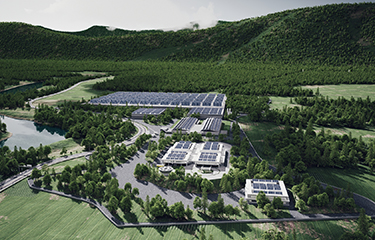Land-based salmon farmer Pure Salmon has just signed a major distribution deal with Japanese trading giant Itochu for the 10,000 metric tons (MT) of Atlantic salmon it aims to produce each year at a new state of the art recirculating aquaculture system (RAS) facility in Tsu City, Japan.
Tsu City is an optimum distance from Tokyo, Nagoya, and Osaka, allowing easy distribution to Japan’s most populous cities and centers of salmon consumption. At 137,000 square metres, it will be the largest land-based salmon farm ever built in Asia.
The facility will not be ready until 2021, but the promise of locally-produced, premium salmon, caught the interest of Itochu, which will distribute the fish under Pure Salmon’s local brand name Soul of Japan.
According to Soul of Japan CEO Erol Emed, the retail value of this agreement is worth approximately USD 200 million (EUR 178.9 million) per year. The company believes that despite being a new business, the deal gives a clear indication to the wider industry that it has a product and an operation that should be taken very seriously. It is less than a year since the launch of Soul of Japan K.K., which is headquartered in Minato-ku, Tokyo, and a full two years before the Tsu City facility goes into production.
“We are delighted to have signed this landmark agreement with Soul of Japan which will bring fresh, healthy and sustainable salmon to our customers in the Japanese market. We also look forward to developing and broadening this relationship in the future to include other markets where Pure Salmon is building land-based salmon facilities,” said Kenichi Tai, chief operations officer of the fresh food division of Itochu.
The deal with one of Asia’s most prestigious trading corporations is exciting news for Pure Salmon, and a major vote of confidence in its vision to sell fish that is produced as near as possible to where it will be consumed, thereby maximizing freshness and product shelf-life, reducing waste and transportation costs, and keeping carbon emissions low.
“This agreement, with one of the largest and most respected distribution partners in the region, is a significant achievement for us and further proof of the huge appetite in Asia for fresh, sustainable, land farmed salmon,” said Stephane Farouze, director of Pure Salmon and chairman and founder of impact investors 8F Asset Management.
Pure Salmon, which is a portfolio company of private equity funds managed by 8F, has already seen its first pioneering facility in Poland become fully operational and producing 4-5kg fish. This success gave them confidence to move forward with ambitious plans for further projects in Africa, Europe, America, China and the current one in Japan. The overall goal is to produce 260,000 MT of salmon per year by 2025 in its RAS farms around the world.
Operating to best practice standards and demonstrating sustainability are taken very seriously by the company, which aims to providing global consumers with safe, environmentally friendly salmon, free from microplastics, antibiotics, pesticides and other contaminants.
Pure Salmon Poland already has endorsements from FishChoice and OceanWise, and the company is a founding signatory to the WWF Sustainable Blue Economy Finance Principles. It is currently undergoing Aquaculture Stewardship Council (ASC) certification and expects to do the same in all its other facilities, including Japan.
“We are undertaking ASC certification for multiple reasons: because many buyers such as supermarkets require it, because end-consumers are becoming more aware of certifications and look for them on packaging, and because we want to demonstrate to buyers and consumers that we are certified for best practice and sustainability. It is also important to demonstrate this to our investors,” Farouze told SeafoodSource.
He believes that expanding the number of land-based RAS facilities is the only way to relieve the oceans of the enormous pressures they are under to provide protein, and reduce the impact on marine ecosystems.
Pure Salmon’s farms use RAS technology provided by Israeli company AquaMaof Aquaculture Technologies, whose land-based fish rearing systems are designed to closely replicate the positive qualities of a salmon’s natural environment and to ensure that issues such as sea lice become a thing of the past. AquaMaof‘s self-contained production units are highly efficient in their use of land and natural resources and recycle 99 percent of the water. AquaMaof is a 50 percent shareholder in the Polish facility.
In its short history, Pure Salmon has become one of the world’s fastest growing Atlantic salmon companies and is now well on its way to becoming the world leader of sustainable salmon production.
Image courtesy of Pure Salmon Japan







